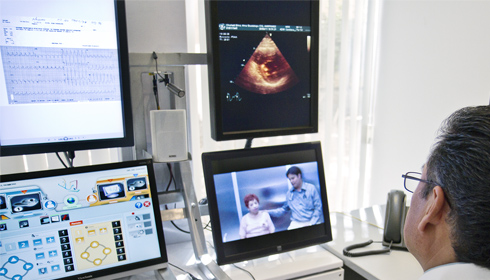
Remote Video Consultations Show Promise in Mental Health Care: BMJ Study
The BMJ has conducted a study on the possibilities of remote video consultations in lowering anxiety and depression symptoms. Researchers in Germany conducted a trial in which virtual video consultations between primary care patients and offsite mental health experts revealed a significant improvement in mental health symptoms, even if the impact size was modest. This study meets the increasing demand to investigate substitutes for treating mental health illnesses, which still rank as the top cause of handicap globally.
The study concentrated on the efficiency of a novel telemedicine model called PROVIDE, which provides patients in primary care environments with real-time video consultations with mental health experts. Between March 2020 and November 2021, researchers looked at 376 persons (average age of 45, 63% women) who contacted their general practitioners (GPs) complaining of moderate to severe depression, anxiety, or both. Researchers randomly paired these patients with either normal treatment or the PROVIDE model.
Over eight weeks, the PROVIDE intervention consisted of five fifty-minute psychotherapy sessions. The patient stayed at their GP's office while mental health experts conducted these sessions virtually from off-site locations. Normal treatment included, by comparison, brief counselling, medication management, and professional referrals.
Measuring the Patient Health Questionnaire Anxiety and Depressive Scale (PHQ-ADS), the results showed a modest but statistically significant decrease in anxiety and depressive symptoms. At six months, patients receiving the PROVIDE intervention had an average PHQ-ADS scale drop of 2.4 points. The PROVIDE group maintained this improvement over a 12-month period, albeit with a slightly greater 2.9-point drop. Furthermore, at six and twelve months, patients in the PROVIDE group reported less psychological suffering related to physical (somatic) symptoms.
Mental health problems, especially anxiety and sadness, are somewhat common all around. However, primary care environments, which restrict access to specific mental health care, treat the vast majority of patients. Given the high prevalence of these illnesses in society, the researchers contend that even if the changes noted in this study were small, they are nonetheless significant.
"These little changes could still be significant at the population level even if the effect size is below the clinically important difference threshold," the scientists said. Particularly in underdeveloped areas, the scalability of the PROVIDE model could help to close the disparity in mental health care access.
The trial also admitted some restrictions. Getting a completely representative and objective sample in a clinical environment and handling the possible influence of missing data proved among the main difficulties. Furthermore, although the PROVIDE model reduced symptoms, it did not clearly offer any advantage in general rates of recovery.
The scientists warn that more research is required to improve the model and maximise its effectiveness in many populations. Notwithstanding these constraints, the PROVIDE model shows a good path for scalable treatments that could together improve public health outcomes in the field of mental health.
Remote video consultations could be a useful technique for alleviating mental health care shortages, as the frequency of anxiety and depression diseases continues to rise. The results imply that even if the advantages are small, digital breakthroughs in mental health care, such as the PROVIDE model, could pave the way for more scalable, easily available solutions.